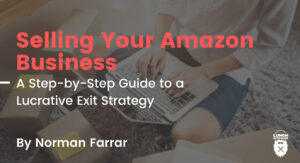
Article Written By Ben Leonard From Ecom Brokers
Many entrepreneurs are ecstatic about the prospect of starting an e-commerce business.
But you know what makes them even more ecstatic?
Selling their business.
It’s a significant career milestone that a) generates cash, b) fulfills another learning curve, and c) demonstrates their ability to run a successful business.
Selling an e-com company isn’t as easy as 1,2,3. There is a lot to consider, and the process is time-consuming.
This article will look at how to prepare your e-commerce business for sale, whether it is Amazon FBA, D2C or a bit of both. We’ll look at why you should sell, what you should do to prepare for the sale, and whether you should sell yourself or hire a broker.
Ready? Let’s get started.

I understand – your e-com brand is your “baby,” which you’ve been nurturing since its conception. You’ve cared for it, fed it. It’s now time to hand over the keys to someone else.
It’s a daunting prospect, but here’s another stumbling block: What if your e-commerce business is making a lot of money? What makes you think you’d sell it?
Actually, there are a few reasons why it might be time to sell an e-commerce business, even if it is profitable:
It is acceptable to sell your company if you require funds. That is not a source of embarrassment.
Indeed, one of the primary reasons entrepreneurs sell their e-commerce business is to raise funds for their next venture. At the time of writing, I am literally helping a guy sell his business so he can sail around the world in a yacht.
At this point, it’s a good idea to assess your current situation in life professionally and personally. What are your ambitions and dreams? What are your plans for the future?
This one is heavily influenced by the reason you started an e-commerce business in the first place. However, if you started an e-commerce business to make it a success (or see how successful you could make it), you may want to sell now if your business has peaked.
In other words, you can leave while you’re still on a high, and you won’t have any regrets about not doing more.
How do you know if your company has reached its peak?
Well, if your business is, say, two to three years old and making a good profit, you’ve most likely made a real success of things.
Furthermore, an e-commerce business that is two to three years (or more) old and profitable is very appealing to buyers.
If you wait another year and your profits fall, your business will no longer be as appealing. As a result, you may want to exit while the going is good to get the most money for your business.
Entrepreneurs are high-energy, creative individuals who never stop working. They begin one project and go “all-in,” only to realize that they want to try their hand at something else. And there’s something else. And there’s something else.
If you’ve reached the point where you’ve enjoyed running an e-commerce business but want to try something new, it’s time to sell. Again, this is a perfectly fine reason to sell.
Growth and self-improvement should be a priority for all entrepreneurs. Otherwise, do you consider yourself an entrepreneur?
Running an e-commerce business is, of course, a great skill, and I commend anyone who succeeds at it.
However, to achieve personal and professional growth, an ambitious entrepreneur must add more strings to their bow — such as navigating and executing an exit.

Mental (and physical) exhaustion is a real thing. If you’ve invested in your e-commerce business but are now dissatisfied with it, it’s time to exit. Been there, done that. I know what it is like to put out fires 24/7. Time for a break.
Now comes the difficult part: Understanding how to value your company so that you can market it at a price that is acceptable to all parties (but mostly acceptable to you).
Let’s start with Seller’s Discretionary Earnings (SDE).
You can find out what yours is by using the following formula:
Profits before taxes + owner compensation
This is a simplified version for the purposes of this article. A good broker will make various financial adjustments to determine the maximum SDE and squeeze value out of the business. A poor-quality broker or a marketplace will not do that effectively.
Let’s say your store made $200,000 in profit last year. You paid yourself a salary of $80,000, resulting in an SDE of $280,000 for your store. This equates to $23,333 in SDE per month.
It is a proxy for the amount of money your e-commerce business generates for you.
To determine its worth, you must determine the SDE multiple. This is based on factors such as historical performance and growth, market size, future prospects, how organized your business is, the economic cycle, and your business’s size.
Now, if your business has been declining in value over the last year or two, and if you’ve neglected it, its value could be as low as a 1.3 multiple on an annual basis.
If, however, business is booming and your store is on the higher end of the spectrum, it may have a 4x or higher multiple.
When it comes to pricing your e-commerce business, you have two options:
Of course, you could do both (recommended).
A good broker will provide you with a rough estimate without pressuring you to work with them.
Market research has its advantages as well. For starters, it shows you the price of how similar-sized businesses and what they sell for. The last thing you want to do is go against the market by either underpricing yourself or overpricing your store.

Depending on your circumstances, you may decide to sell right away.
Alternatively, you may decide to spend the next several months preparing your business to increase its value.
What are YOUR options?
Let’s take a look at something.
Assume your company made $100,000 in pure profit in the previous 12 months. However, you’ve spent a lot of money on it (you haven’t run it leanly), and you’ve done almost nothing in terms of marketing.
Worse, sales have dropped by 20%.
You believe you could sell your brand for a 1.5x multiple because of all of these factors. That means if you sold it right now, you’d get around $150,000 for it.
On the other hand, how much could you get if you spent the next year preparing it for sale? This entails increasing marketing spending, improving SEO, reducing waste, and increasing sales and profits.
After all of that, you should be able to sell your brand for a 2x multiple.
The big question now is whether it’s worth it to wait another year and put in more effort for an extra $50,000 or whether you should cut your losses and sell now.
It is not for me to tell you what to do in this situation. It is up to you, but you should at the very least perform the preceding exercise to determine how much money you would be leaving on the table if you sold now.
A good broker will play the long game and collaborate with you to help you achieve the goals you want. A generic flipper-style broker or marketplace will probably encourage you to sell quickly to get their hands on a commission.
When you first start your e-commerce business, you should plan on making long-term investments. But you don’t want to do that if you’re planning to sell it.
Why is this so?
Because how much your business earned in the previous 12 months plays a significant role in the selling price. As a result, any money saved can be applied to the transaction.
Naturally, you don’t want to jeopardize your business by cutting corners. However, you must strike the proper balance.
Note – a good broker will do more than simply value your business on the trailing 12 months; they should also be experienced accountants who can make legitimate financial adjustments to squeeze extra value out of your business,
Buyers will not consider your company until it begins to generate consistent profits. When calculating your monthly earnings, I recommend using accrual accounting.
Also, as a general rule, buyers do not look at businesses that make less than $250,000 in net profit per year.
Defensibility refers to how difficult it is for a competitor to launch the same (or a similar) product as yours and devour your market. If it is simple to obtain your product, it indicates that you have poor defensibility. This could also turn off a potential buyer.
Essentially, if your product is too easily available on sites like Alibaba, you must ask yourself: What is stopping others from coming along and taking my market away from me? All they have to do is set up an account and a new listing, and they can begin selling the same product.
Aside from selling a unique product, there are a couple of other things you can do to increase your defensibility:
Diversification is another way to increase your value.
What does this mean in terms of Amazon FBA?
Prospective buyers will look at your store to see what might happen if your Amazon account is suspended. If that happened, you’d lose your Amazon ranking as well as all of your customers.
Unless, of course, you’ve already diversified.
Diversification entails being able to continue operating a profitable business even if things go wrong on Amazon. For example, perhaps you sell products on platforms other than Amazon and have traffic sources other than Amazon (such as social media and email).
It also implies that you sell in more than one niche and, more importantly, that you have a brand that can withstand being kicked off Amazon.
Too many FBA entrepreneurs are tethered to Amazon. This means that everything they do is reliant on the e-commerce behemoth. All it takes is an account suspension to effectively end their business.
It’s essentially the same as being at the mercy of a social media platform like Facebook. If your entire business relies on a third party, it will be unappealing to buyers because they know that all it takes is Mark Zuckerberg to pull the plug for your company to fail. This is why diversification is critical, and I cannot emphasize it enough.
Here are some ideas for diversifying your FBA business:
When a prospective buyer is considering your company, they will look at your competitors.
If you’re selling a super popular product that others are also selling, your rankings could fall at the drop of a hat. This, of course, implies that your earnings will follow. It’s the last thing you want and the last thing buyers want.
The simplest way to eliminate competition and thus increase the value of your business is to sell either unique or patented products, develop your own products, or diversify (see above).
Let’s face it: few entrepreneurs can claim that their books are spotless and well-organized. Accounting often isn’t our top priority.
However, as you prepare to sell your e-commerce business, you must get your accounting in order.
You can collaborate with a reputable accountant who specializes in e-commerce clients. This will improve your credibility and help you find a buyer faster.
See, if your books aren’t in order – if they’re disorganized and difficult to navigate – any prospective buyer will be put off. Furthermore, they may not believe the figures you provide. This can waste a lot of time and indicate that their price is far below your worth. An e-commerce seller who has organized their books demonstrates that they can also close a deal without much difficulty.
Of course, a good broker will also have e-commerce accountancy expertise and help in this respect.

What exactly is a link profile?
It is an important aspect of SEO that determines how high or low your site ranks on Google.
What is the significance of this?
The higher your Google ranking, the more organic traffic you will receive. This is, of course, great for selling products – and great for advertising your e-commerce business to prospective buyers as something valuable.
Before you sell, you must review your link profile to ensure no spammy links drag down its ranking. This is important because you will need to show prospective buyers data such as your site’s analysis and conversion rates. If bad links skew your data, it will make you look bad.
How can you check the link profile of your site?
It’s not an easy process, but tools like SEMRush, Moz, and Ahrefs can help. These are SEO tools with features that will assist you in improving your link profile.
An overall solid SEO strategy, in addition to a good link profile, is critical to the success of any e-commerce site.
And if your website ranks highly on Google, it will greatly benefit you when selling your business.
As a result, cleaning up your SEO is an important part of the process as you prepare to sell.
Of course, SEO is extremely complex, and delving into it in depth is far beyond the scope of this article. However, here are a few pointers:
When it comes to selling your e-commerce business, a supplier contract is critical because it can mean the difference between a good deal and a great deal.
Why?
Consider this: If you have a great relationship with your current supplier, and you’ve modified the contract so that it’s transferable to a buyer, your business will be much more appealing.
If, on the other hand, you don’t have a good relationship with your supplier, and they give you a low margin, it won’t help you negotiate a good deal.
Another thing that makes an e-commerce business more appealing to potential buyers (and thus helps to increase its value) is an automated e-commerce business.
Assume, for example, that you do everything yourself. You source the products, manage the inventory, keep the books and even handle customer service and web design.
It’s a lot of work, and any prospective buyer will cringe at the prospect of taking on all of it. They’ll want to outsource a lot of those tasks right away.
Wouldn’t it be better if you outsourced those tasks now, allowing you to charge a higher price for your business?
Obviously, hiring more people means incurring more expenses. However, by automating your business, you will be preparing your e-commerce business for sale. Potential buyers who aren’t interested in running everything themselves will find it more appealing.
Furthermore, if you automate your business 12 months before selling it, you will have 12 months to scale and increase your revenue. As a result, you can make up the difference by hiring more people.
Is your accounting cash-based? It really should be accrual-based.
Why?
Because it provides a clear picture of how well (or poorly) your company is performing.
How does it accomplish this?
By displaying when expenses and income occurred for you (and potential buyers).
Assume a buyer is interested in how your company performed in March, April, and May. He or she can see this at a glance if he or she uses accrual-based accounting.
All of this is not to say that there is anything wrong with using cash-based accounting from time to time, such as tax purposes. But it’s a good idea to contact your accountant as soon as possible to make the switch because it could take them a few hours or a week to flip your books.
A good broker will have e-commerce accounts experience and can help you with this.
Prospective buyers of your business will go through an intense due diligence process.
And if you don’t have the proper documentation, this due diligence phase can be fatal. They want to find flaws in your company. They want to come up with reasons why they shouldn’t buy it. And if they find flaws, they’ll either back out completely or re-negotiate the price. This means you won’t get the desired price.
So, what documentation are you looking for? You will require the following items:
It’s not much, so there are no excuses if you don’t have everything in order.
We discussed the significance of profits at the beginning of this article.
And one of the most effective ways to increase profits is to improve your efficiency.
Why?
Because the more productive your company is, the more efficient it is. Profits will rise as a result.
It’s a good idea, then, to look at your business from various perspectives by delving into your internal operations. You could hire an efficiency expert to assist you.
In either case, you’re looking for areas of your business that aren’t performing well and, as a result, are slowing you down (and bringing profits down with them). Once you’ve identified the areas that aren’t performing well, you can put in place new systems to make the process run more smoothly.
This is a very simple method of increasing productivity (and revenue). At the same time, it is worth noting that it will lower your operating costs (with the added benefit of not sacrificing quality). More productivity combined with lower operating costs will increase your company’s value and make it more appealing to buyers.
This one is particularly important for off-Amazon sales, such as D2C websites.
Of course, fulfillment is critical to the success of an e-commerce business.
But suppose you handle all your fulfillment operations in one location.
This immediately reduces the number of potential buyers.
Why?
Because if a buyer in Thailand is interested in your business but intends to run it remotely, they will be unable to purchase it if your fulfillment operations are based in one physical location. It’s a dead-end, which means you’ll miss out on a potentially lucrative exit.
This is why working with a 3PL(third-party logistics provider) is a good idea.
A 3PL customizes and fills the gaps in your fulfillment solutions (warehousing, packaging, shipping, etc.). It contributes to making your e-commerce business more appealing to buyers and can even add some extra numbers on top of the price.

You should sell with the help of a good broker. Here’s why:
So you’ve been approached by a buyer. Alternatively, you approached a buyer. You could sell to them directly.
But that is a bad idea.
a) You Will Throw Money Away
b) A Good Broker Will Do it for You While Earning You More Money
You believe you’ve worked hard on your company, putting your heart and soul into it. Now try to sell it. It’s a massive amount of work. Not only are you attempting to set up the sale, but you are also attempting to run the business.
Consider everything you do for your business, then add preparing it for sale, marketing it, and answering all of the potential buyer’s questions (which are numerous). It’s not enjoyable.
You need experts to do it for you, and they must do it well.
c) A Good Broker Has Experience on All Sides
Standard brokers are classified into two types: “Consultants” and “Flippers.”
Flippers
Flippers essentially ‘list’ your company for sale on their website. It’s similar to eBay for businesses.Essentially, you agree to sell your company to them, and they pull reports from your selling accounts and website to determine your company’s value. Then they’ll “list” it. That is all there is to it. They are simply middlemen. And their fees are exorbitant.
Consultants
There has recently been an increase in the “consultant model.”This “cheap and cheerful” approach boasts of having extremely low fees. That is correct. So low that a professional broker would be unable to do anything to work on your deal.
This model typically entails the consultant simply referring your company to their buyer list and collecting a referral fee (usually between $25k and $50k) from the buyer in addition to the percentage they charge you! That’s not cool.
A new model has emerged in response to all three of the disasters mentioned above (direct sale, flipper brokers, and “consultants”). Enter the so-called “Private FBA Market.” This marketplace style claims to have cracked the code. There will be no broker fees, but there will still be a competitive environment where the best deal will win. Doesn’t it sound too good to be true? That is because it is.
There are several flaws in this model. First and foremost, you DO pay a commission. Buyers include the fee they pay to the marketplace in their offer and deduct it from the amount they would have paid you.
Second, you’re on your own to bargain. You’ll be taken to the cleaners by experienced buyers who want to take your business for as little as possible on their terms. This service is nothing more than a middleman.
Finally, it operates on such a large scale that, while they claim that sellers are represented by financial experts, it is simply not possible for them to provide a fully customized service that results in a full, in-depth assessment of the true value of your business (addbacks and all).
Good brokers are more than just “middlemen” who connect a seller and a buyer. You need to work with e-commerce experts who will help you position and prepare your business for the best possible valuation, deal, and exit.
A good broker should handle everything – vet your company, find the best buyers for you, and even arrange M&A legal representation for the final negotiation and deal signing.
Simply put, if you use the wrong broker or do not use a broker at all, you are selling yourself short.
Further, a good broker will want to sell your business when it is right for you to sell. That means they should work with you over time to get you where you want to be. This could be to sell in six weeks, six months, or even two years.
This is not done by either the flippers or the consultants. They will simply sell your company “as is,” which will benefit them but not you.
With real experience in e-commerce operations and accounting, good brokers should help you organize your business from top to bottom. This maximizes the value while also making it as appealing to a buyer as possible.
Finally, rather than simply list your business for sale, or email a bunch of aggregators, a good broker does so much more.
Your broker should create an accurate valuation after thoroughly vetting your company. Then (and this is crucial), they should approach the appropriate buyers for your company. This refers to buyers who are in the best position to advance your brand. This is critical because (depending on the deal structure), a significant portion of your payment may be contingent on the new owner’s success with the brand for the next year, two years, or more. Typically, the brokers will only present your company to a small number of carefully selected buyers enough to create a competitive environment with only the best players.

When you put your company up for sale, someone will come along and make you an offer. A few factors will determine whether or not you accept their offer.
If you are working with a good broker and legal representative, they will help you with this.
For one thing, how eager you are to close a deal will be taken into account. If you are in a hurry, you will be in a weaker bargaining position. If you’re not in a hurry, you’ll have more leeway.
If a buyer makes an offer lower than your asking price, you should consider whether they have a good reason for doing so. And, hey, maybe you know the buyer and have faith in them to make this a success. As a result, you’re willing to take a hit.
What are the terms of the agreement? Will the buyer make a lump-sum payment or pay in installments? The terms of any transaction are just as important as the price. Even if you get the right price for your business, you’ll lose out if you don’t get the terms you want.
You can also sweeten the deal by suggesting that you stay on as a consultant for a set period while adjusting to the business. This is a strategic concession, and you may find that you need to make more of them as the negotiation progresses. There will be a lot of back and forth, and you may be asked to give up something valuable in exchange for something else valuable.
It’s a big step to sell your e-commerce business. It is critical that you first determine whether this is the right step for you. When the time comes, use the information in this guide to help you prepare your business, value your business, and negotiate a deal that is right for you.
I built, scaled, and sold an international seven-figure e-commerce business. Now I’m doing it again with several new brands. I consult with e-com businesses to help them get clear, take control, and scale. And I co-founded Ecom Brokers — the brokerage by e-commerce people for e-commerce people.
Ben Leonard Best known as the founder of Beast Gear, Ben Leonard is the classic millennial entrepreneur. He built a business on a laptop, in a cupboard, in his spare time. The difference? Ben grew an international 7-figure business and successfully exited after 3 years; the business holy grail.
Contact Ecom Brokers today to get the best price for your e-com business – https://www.ecombrokers.co.uk.

Ben Leonard Best known as the founder of Beast Gear, Ben Leonard is the classic millennial entrepreneur. He built a business on a laptop, in a cupboard, in his spare time. The difference? Ben grew an international 7-figure business and successfully exited after 3 years; the business holy grail.
Contact Ecom Brokers today to get the best price for your e-com business – https://www.ecombrokers.co.uk.